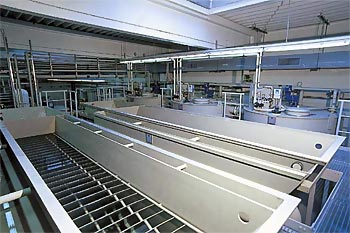PRECIPITATION / FLOCCULATION
Precipitation

Fluoride precipitation plant with two-line inclined clarifiers and three reaction tanks (10 m3 each)
Precipitation is the formation of hardly soluble or almost insoluble compounds through chemical reaction with added process chemicals. One of these processes is the neutralisation precipitation of heavy metal hydroxides, important for wastewater treatment.
Neutralisation of metalliferous wastewater also causes precipitation of these metals in the form of their hydroxides, provided that the metals have not formed stable complex compounds. If metal complexes (e.g. cyanide complexes) are present, these must be destroyed through suitable measures before the hydroxide precipitation can take place.
Flocculation
Flocculation is a process action that generally follows a precipitation process. Often during precipitation, only fine-flocculant or finely dispersed substances are produced that sometimes are even colloidal and only cause turbidity. Separation of these precipitation products through sedimentation or filtration is then very complex or even impossible. In order to exclude these kinds of negative effects, a flocculation aid is dosed into the wastewater after precipitation. Flocculation aids have free valences acting upon the suspended matter and collecting them. Thus, larger flocs form that settle more quickly, shortening the settling times and allowing smaller settling tanks.
| Series compact plants: | SPLIT-O-MAT 1000-4200 |
| Individual plants: | Heraeus Gmbh |



